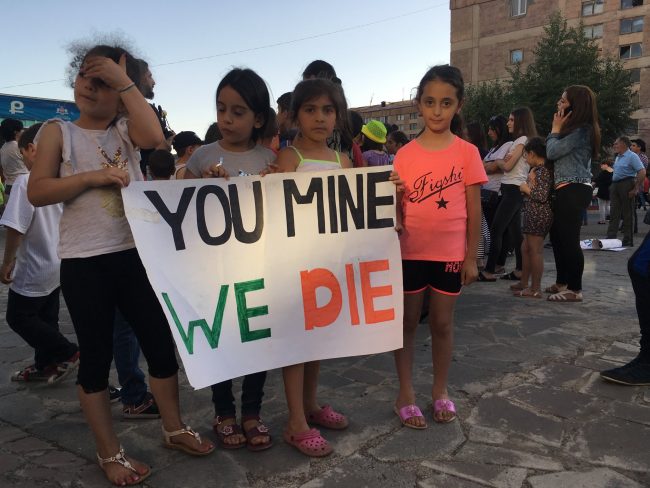
 For the past three months, the inhabitants of the Armenian spa town of Jermuk have been rallying against the local Amulsar gold mine. The company operating the mine claims their operations are environmentally sound and has threatened to sue the Armenian government if they have to suspend work. All eyes are now on Armenia’s revolutionary government, which has promised ‘power to the people’.
For the past three months, the inhabitants of the Armenian spa town of Jermuk have been rallying against the local Amulsar gold mine. The company operating the mine claims their operations are environmentally sound and has threatened to sue the Armenian government if they have to suspend work. All eyes are now on Armenia’s revolutionary government, which has promised ‘power to the people’.
Lydian International Ltd, a Jersey based company established in 2005, has been warning potential investors of the risks associated with investing in the company’s gold mine in Armenia. Risks in Armenia, Lydian warns, are not ‘typically like those in Canada; the company’s results may be adversely affected by changes in political and social conditions’.
Ironically, this token note, affixed like a cigarette warning to the company’s financial reports, turned out to be prophetic. The company’s first gold mine in Armenia (named ‘Amulsar’ after the mountain it’s built on) may have to close before it even starts fully operating, as a result of opposition from local communities in Jermuk. Local activists claim their blockade — which has effectively shut down the mine’s operations for the past two months — has been inspired by the new wave of civic activism which has swept across Armenia since its Velvet Revolution in May.
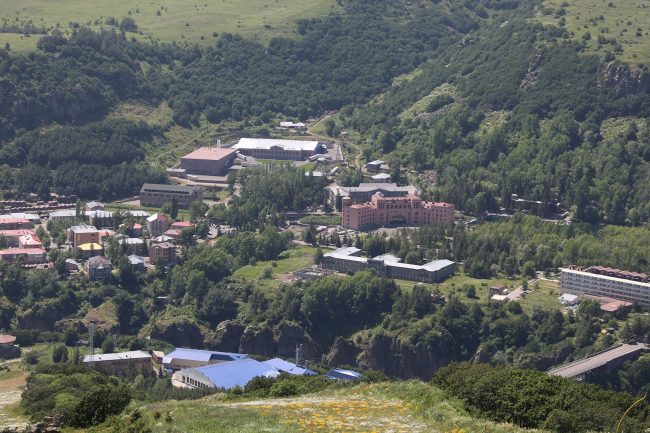
Proud New Armenians
To understand the sudden rise of the movement against the mining company, one has to drive 170 km south-east from Armenia’s capital city, Yerevan, into the mountainous landscape surrounding Jermuk. The young men who greet you are blocking the road to the mine; they smile as they tell you, ‘this is not what you think it is’.
Stepping out of your car, you are greeted by sunburnt young protesters in sports gear who offer coffee and a piece of shade at a rusty Soviet-era bus stop. This is the first of four checkpoints blocking the mine entrance that have been hindering construction for three months now.
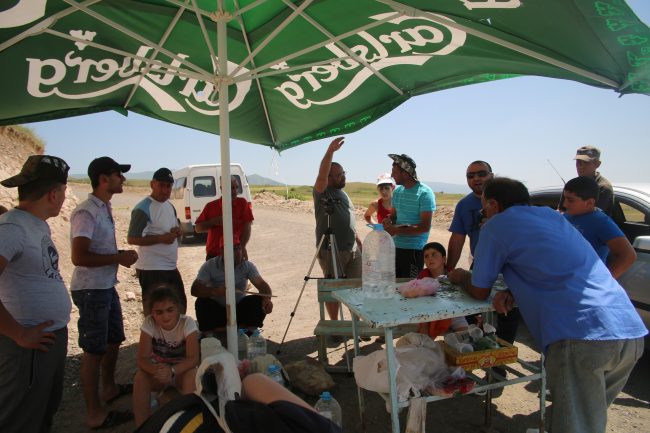
Those manning the blockades call themselves ‘the defenders of Amulsar mountain’, and are determined not to leave their posts until the new government decides whether to permit the mine to continue operating or to close it down on environmental grounds.
The first checkpoint is manned by young men, mostly former classmates.
‘We weren’t friends until now. There are no hangout spots in our town, even tourists get bored, so we didn’t see each other much. Our common fight helped us bond and reconnect’, says one of the classmates, Sahak, as he restarts their interrupted card game.
Some of those at the first-post are also workers of the very mine they are now blockading.
‘I worked on constructing the conveyors, which would bring the rock containing gold to the processing plant. Of course, they wouldn’t let Armenians deal with the gold itself — only foreigners would work inside the plant’, says Vahe.
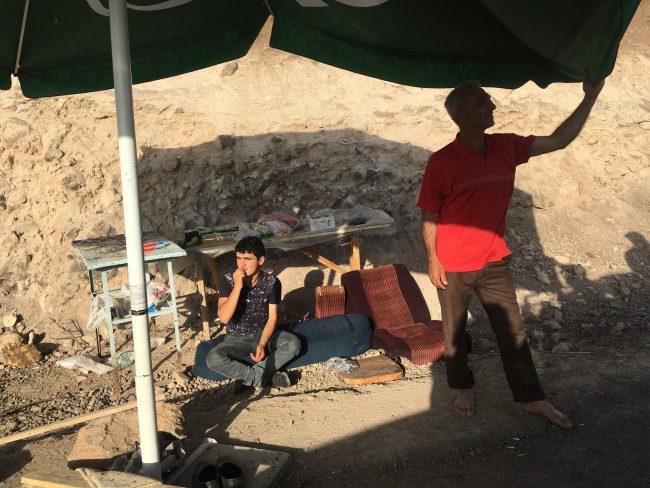
Davit, another former senior mine worker, told us the story of his conflict with the mine authorities as he drove us to the second checkpoint.
‘We had morning meetings every day; one day we were told that if we arrived late, we should not enter and disturb the discussion. So one day I arrived five minutes late and didn’t go into the [meeting] room. An Italian engineer came out and started shouting at me. Of course I shouted back. A few days later I was summoned by HR and asked to sign a letter of resignation which read that the company “wasn’t satisfied with my performance”. I knew the reason for my being fired was the fight with the Italian, so I refused to sign the letter, even though HR said I couldn’t refuse, as it had been sent from Yerevan’, Davit told OC Media.
The exploitation and discrimination against workers at the gold mine was appalling, he added, but the defenders chose not to go into ‘workers rights issues’ as the focus of their protest was ‘the protection of nature’.
At the fourth and final post, mostly older men gathered — veterans of the Nagorno-Karabakh War, who had witnessed the past 20 years of Armenian state-building. The oldest of the men sat at the end of a small table, making toasts, playing the accordion, and inventing witty captions for posters.
‘Whoever had the opportunity to go looting after the war got their hands on newly privatised properties. They gradually became oligarchs, [and rose to become] local authorities. It never occurred to us to do the same. We only wanted to earn enough to support our families. We never had that greed’, said one of the veterans.
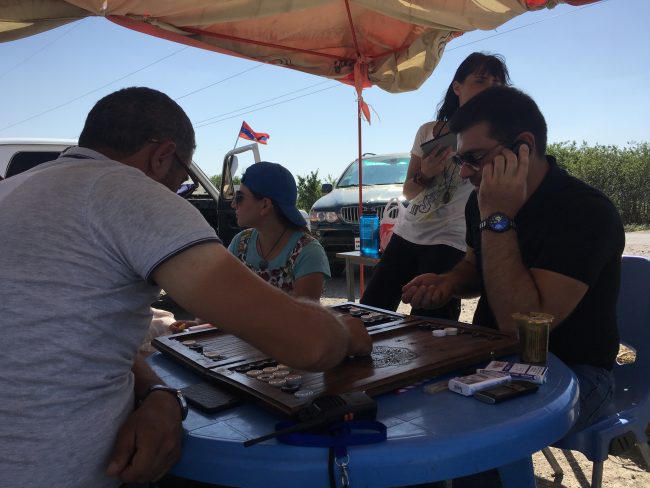
‘Even the Velvet Revolution didn’t reach Jermuk. The whole country was on strike, but the people of Jermuk were afraid of the local oligarchs. The state of terror used to be strong here’, said another protester, Sharl.
Jermuk, unlike other major towns, doesn’t have a local TV station. Varuzhan, a local journalist who used to run a cable TV channel in the 1990s, is sad about this. ‘I now work as an electrician in a spa resort, but journalism is my passion. I make video reports in Jermuk and post them on my YouTube channel’, Varuzhan says.
‘Too emotional’
According to the mine’s owners, the locals’ scepticism towards mining can be explained by the legacy of irresponsible mining elsewhere in Armenia. Lydian Armenia claims the site’s location near three rivers, three reservoirs, and Jermuk, a mineral water spa town, shouldn’t be alarming, as they are using best practice to ensure no industrial water leaks into the rivers.
Lydian’s metallurgical manager, John Fourie, announced at a meeting in the nearby village of Gndevaz in April 2017 that the mine’s cyanide heap leaching facility, which caused particular alarm among locals, would be ‘so safe it could be located in the centre of Yerevan’. The company’s CEO, Hayk Aloyan, called for local people to refrain from being ‘too emotional’ and ‘trust in science’.
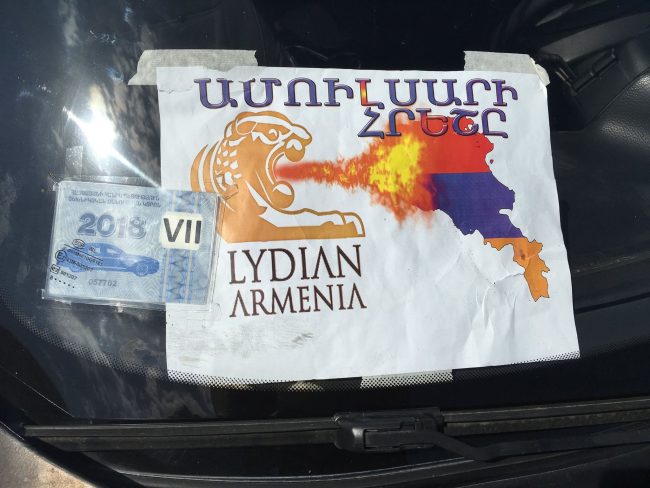
However, Lydian’s project has also come under fire from local scientists. A group of independent Armenian geologists studied the site and released an ‘alternative assessment’. One of the staunchest critics of the project, Dr Armen Saghatelyan, argues that mining at Amulsar will bring about a ‘cocktail of acidic waters rich in heavy metals’, which threaten to contaminate the local water sources.
The mine site is rich in elements such as sulphide and arsenic - when exposed to acidic water, these can become toxic. Dr Saghetalyan argues that if left alone, the existing metals in the area would remain undisturbed, or at worst, be oxidised into harmless rust. However, if the mining goes ahead, these metals would be exposed and could end up contaminating the local rivers.
Apart from local experts, four international scientists also studied Lydian’s data. They concluded that the Amulsar Project had a high risk of generating acidic rock drainage -an outflow of toxic water from the mine -that would put the Arpa, Darb, and Vorotan rivers and the local environment at risk.
According to their evaluation, Lydian Armenia has underestimated all these risks and designed inadequate mitigation measures in order to save on costs. For instance, Lydian plans to treat mine water only in the fifth year of the project and does not plan to have a Lime Treatment Plant on site, which would have cost an estimated $125–185 million over 200 years.
When the report was read aloud at a surprise intervention during a Lydian Advisory panel presentation on 22 May, panellist John Harker dismissed the arguments.
‘The young student said there is no such thing as safe mining’, he remarked, ‘interestingly, she did so holding in her hand a mobile phone that works only by virtue of mining’.
Corporate imperialism
The company’s stated aim is to turn Amulsar into Armenia’s largest gold mine, producing an annual average of approximately 225,000 ounces of gold over an initial ten-year lifespan. For such a large project, the company has solicited funds from investors, among them financial institutions such as the World Bank group — which abandoned the project in 2017 — and the EBRD, and it is currently trading on the Toronto Stock Exchange.
People in Jermuk express suspicion over the way the company is financed as well as the fact that it is registered offshore.
‘First they launder money, then they launder gold [in a cyanide solution to separate it from rocks], then they launder [purify] the water. I call this company a big laundry machine’, says local resident Samvel Poghosyan.
This was a criticism echoed by economist Hrant Bagratyan, Armenia’s first Prime Minister, who called out the hypocrisy of international institutions financing such a risky project.
‘The World Bank and similar institutions love to come and interfere. Whenever the state borrows a little money, they come to regulate [how the loans are spent]. But in this case, they don’t do that, as it’s a Western company that is set to get its revenue and leave the country. This case illustrates the bourgeois nature of these institutions. See what vocabulary I am using — even as one of the fathers of capitalism in Armenia’, Bagratyan said in a July interview.
Lydian doesn’t see anything untoward about the way in which it is financed. The company claims to have become one of the biggest investors in Armenia, with over $320 million invested and commitments to invest another $120 million after the operation begins.
When addressing an Armenian audience, the company prides itself on its large investment, despite calling Amulsar a ‘low-cost’ mine in financial reports to investors. As the company is accountable to its shareholders, Lydian’s managing director Hayk Aloyan announced it would sue the Armenian government if it decided to close the mine.
Environmental activist Anna Shahnazaryan places the case of the Amulsar mine in the wider context of global trends, which focus on letting the market regulate itself making it superior to the legislation of sovereign states. She argues that global powers seek to deregulate developing countries in order to protect big companies from any legal consequences of their actions.
‘We are talking about a company that is financed mainly through hedge funds. Its so-called “investors” are agents dealing with securities, managing assets such as private pension funds. This means they are purely financial entities. Where there is finance, there is room for manipulation’, Shahnazaryan told OC Media.
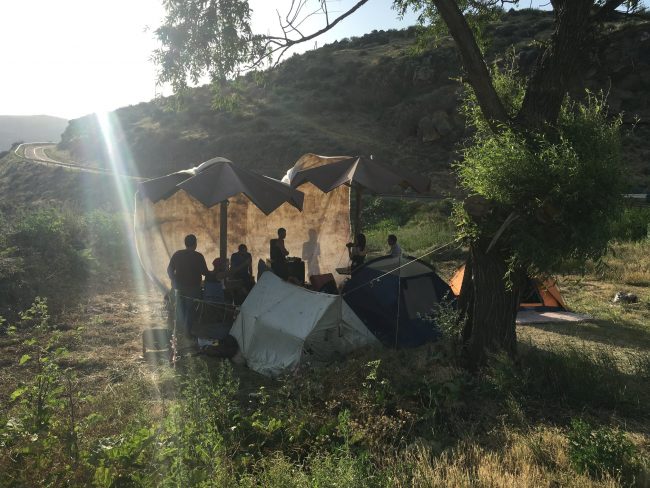
All eyes on Pashinyan
Everyone is impatient for the revolutionary government of New Armenia to make a decision on the mine. The roads to the Amulsar construction site have been blocked for over three months now causing the company, by its own estimates, $500,000 per day. To address the issue, a few simultaneous inspections are under way.
An ad hoc group has been created by Prime Minister Nikol Pashinyan, which comprises 24 geologists and lawyers, civil society members, and people from the affected communities. The group is currently studying Lydia’s documents and is expected to make a decision next week.
The Nature Protection and Inspection Department, under its new head, environmental lawyer Artur Grigoryan, was quick to pass judgment. In a statement on 27 August, the Department proposed that the Nature Protection Ministry annul the report it published on the Amulsar Mining Project in 2016 on the basis of ‘newly emerged’ environmental factors.
Biodiversity concerns are at the core of the issue. At least one endangered plant species and one endangered butterfly species have been discovered in the Amulsar area. The statement also asks the company to refrain from performing any activity related to soil management until a new expert assessment is conducted.
The Prosecutor General’s Office was quick to react to the Inspection Department’s claims. It announced on 30 August that a criminal case had been launched against the company for ‘breaching the rules for the protection and use of lithosphere’. According to the announcement, the company has carried out soil management activities causing ֏18 million ($38,000) worth of damage to the state.
The dawn of direct democracy
On the 100th day of his government on 17 August, Pashinyan once again convened a crowd in Yerevan’s Republic Square and elaborated on his vision of the political transformations to come. Pashinyan, who has avoided explicitly stating many of his political beliefs, only said that ‘the time of “-isms” ’ was over and that it was about time to introduce a ‘referendum culture’ to the country.
Pashinyan told the crowd that they were the ‘only supreme power’ in the country and that amendments were needed ‘to empower the government and the people to make decisions on local, regional, and national issues’.
Pashinyan and the Amulsar protectors seem to agree on the idea of sustaining the revolutionary spirit through perpetuating public participation in decision making. The future of the mine is set to be a litmus test of the new government’s commitment to a more direct democracy, but it may also represent a challenge to the country’s sovereignty, if international arbitration comes into play.
This article was prepared with support from the Friedrich-Ebert-Stiftung (FES) Regional Office in the South Caucasus. All opinions expressed are the author’s alone, and do not necessarily reflect the views of FES.




 13 September 2018
13 September 2018


